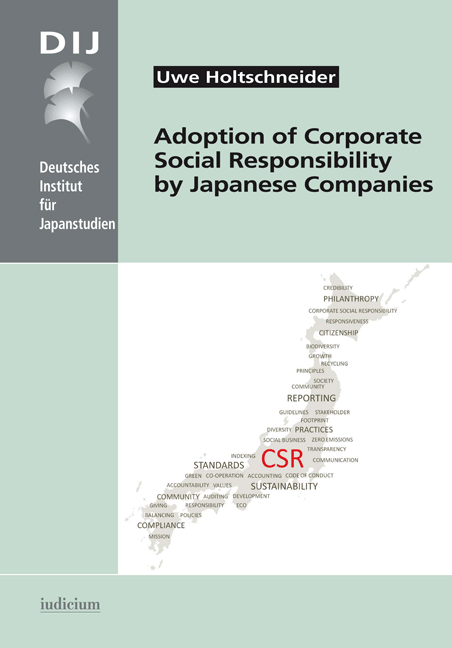|
 Holtschneider,
Uwe Holtschneider,
Uwe
Adoption of Corporate Social Responsibility by Japanese Companies
2015 · ISBN
978-3-86205-047-5 · 289 Seiten, geb. · EUR 49,—
Monographien, herausgegeben vom Deutschen Institut für Japanstudien (Bd.
59)
Corporate social responsibility (CSR) is a topical issue in many
countries. What are the drivers for the global spread of explicit CSR –
practices that are demonstrated to the outside – even in countries
where companies had addressed CSR implicitly? What catalyzes organizations
to adopt CSR and how does their adoption influence other companies’
likelihood to adopt CSR? This book approaches the recent world-wide adoption
of CSR practices as part of the global spread of management concepts. The
trend to adopt CSR is examined among Japanese companies, because they have
rapidly adopted CSR practices in the last two decades. Existing empirical
research on CSR in Japan that has focused mainly on anecdotal evidence on a
small number of outstanding companies is extended by employing both
qualitative and quantitative empirical research methods. Analyzing drivers
for the adoption of CSR practices, organizational characteristics of
adopting companies, and how increasing adoption influences the likelihood to
adopt provides insights into how Japanese institutions and stakeholders
facilitated rapid CSR adoption and the process of CSR diffusion.
CONTENTS
1. Introduction
2. Corporate Social
Responsibility
3. Theoretical Framework
4. Corporate Social
Responsibility in Japan
5. Empirical Part I: Qualitative
Analysis of CSR Adoption by Japanese Companies
6. Empirical Part II:
Quantitative Analysis of CSR Adoption by Japanese Companies
7. Findings, Conclusions, and
Implications
Appendices – References –
Conducted Interviews – Footnotes
|
